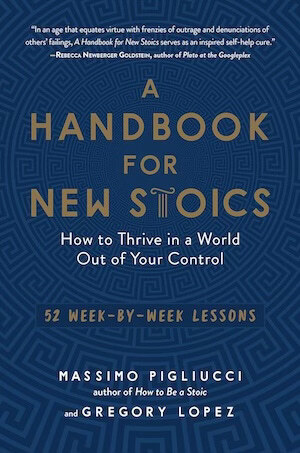Massimo Pigliucci's Blog, page 19
March 8, 2024
Aristotle on the importance of external goods
“Happiness manifestly requires external goods in addition, just as we said. For it is impossible or not easy for someone without equipment to do what is noble: many things are done through instruments, as it were—through friends, wealth, and political power.
Those who are bereft of some of these (for example, good birth, good children, or beauty) disfigure their blessedness, for a person who is altogether ugly in appearance, or of poor birth, or solitary and childless cannot really be characteriz...
March 4, 2024
Practice like a Stoic: Introduction

Back in 2019 my friend Greg Lopez and I published a book that is still, insofar as I know, unique: A Handbook for New Stoics—How to Thrive in a World out of Your Control (The Experiment). It is a collection of 52 exercises, which we propose reader try out one per week during a whole year, to actually live like a Stoic.
In the series of posts we are starting today I will propose one such exercise every Monday, and interested readers will discuss with me and Greg—who has agreed to participate to th...
March 1, 2024
It ain’t no fallacy: on living according to Nature
 The human heart typically operates “in accordance with Nature,” that is as Nature “intended.” Even though Nature doesn’t actually have intentions.
The human heart typically operates “in accordance with Nature,” that is as Nature “intended.” Even though Nature doesn’t actually have intentions.Sometimes I’m asked to provide a capsule version of Stoicism. Or a bumper sticker version. Or an elevator speech version. You know, the whole thing in a nutshell. The bottom line. It’s incredible how many phrases American English has for “simplify to the essence.” Except that sometimes things are just a bit too complicated to be written out on a bumper...
February 28, 2024
E-book: The Peloponnesian War

Dear Reader,
Here is the sixth installment of my ongoing series of free e-books based on essays that have appeared either here at Figs in Winter or at one of my previous blogs.
This new collection features eight essays covering the full span of the famous Peloponnesian War that pitted Athens against Sparta and that eventually paved the way for the conquest of Greece by Alexander the Great.
My version is based on the famous History of the Peloponnesian War by Thucydides, and it’s an incredible story...
February 26, 2024
Epicurus on sex, drugs, and rock ’n’ roll
“When I say that pleasure is the goal of living I do not mean the pleasures of libertines or the pleasures inherent in positive enjoyment, as is supposed by certain persons who are ignorant of our doctrine or who are not in agreement with it or who interpret it perversely.
I mean, on the contrary, the pleasure that consists in freedom from bodily pain and mental agitation. The pleasant life is not the product of one drinking party after another or of sexual intercourse with women and boys or of t...
February 23, 2024
The story of the pale Stoic in the storm
 An ancient ship in the middle of a storm.
An ancient ship in the middle of a storm.Fear is a basic human emotion. Or is it? It depends on what you mean by “fear.” Modern cognitive science recognizes two different forms of most basic emotions: a pre-cognitive and a cognitive one. In the case of fear, for instance, the pre-cognitive form consists in the feeling you get when an autonomic physiological response is initiated by situations your brain subconsciously recognizes as potentially dangerous. It’s that rush of adrenaline that poises ...
February 21, 2024
Suggested Readings
 Woman with wax tablets and stylus (so-called "Sappho"), Naples Archeological Museum
Woman with wax tablets and stylus (so-called "Sappho"), Naples Archeological MuseumWho controls technology? The topic of whether and how societies can exercise control over technology has been discussed for many decades. From Martin Heidegger’s 1954 essay “The Question Concerning Technology,” McLuhan’s 1964 “Understanding Media” and Jacques Ellul’s “The Technological Society” of the same year, to today’s Technoscience theorists, we have thinking about technology for over half a century now. Stil...
February 19, 2024
Epictetus on the purple in the toga
“Which is preferable, death or life? Life, of course. Pain or pleasure? Pleasure, of course.
‘But if I refuse to take part in the Emperor’s show, I’ll lose my head.’ ‘Go ahead, then. Take part. But I won’t.’
‘Why me and not you?’ ‘Because you’re thinking of yourself as just one thread in the toga.’ ‘Meaning what?’
‘You’re bound to care about how to be similar to other people, just as a thread too wants to be no different from all the other threads. But I’d like to be purple, the little bit of brigh...
February 16, 2024
Video chat: Mark Usher on Cynicism and how to say NO
Welcome to the sixth of an occasional series of video chats with authors and translators who have written about the philosophy, culture, and history of the Greco-Roman tradition.
In this episode I talk to Mark Usher, the Lyman-Roberts Professor of Classical Languages and Literature at the University of Vermont. Mark specializes in the ancient Mediterranean world, particularly the languages, literatures, and cultures of Greece and Rome. His interests include orality studies, ancient ecologies, and...
February 14, 2024
A Stoic guide to your Valentine Day

Here we go again, Valentine Day is coming! And we are all preparing for a night of going to overpriced restaurants, eating mediocre food accompanied by so-so wine, and going home with the vague sensation that someone, somewhere, has manipulated the whole country into this kind of thing just to make money. And that’s if it goes well, of course. And if you are lucky enough to have a Valentine this year.
Fear not, Stoic advice is here to help. First, some preliminaries, beginning with the historical...



